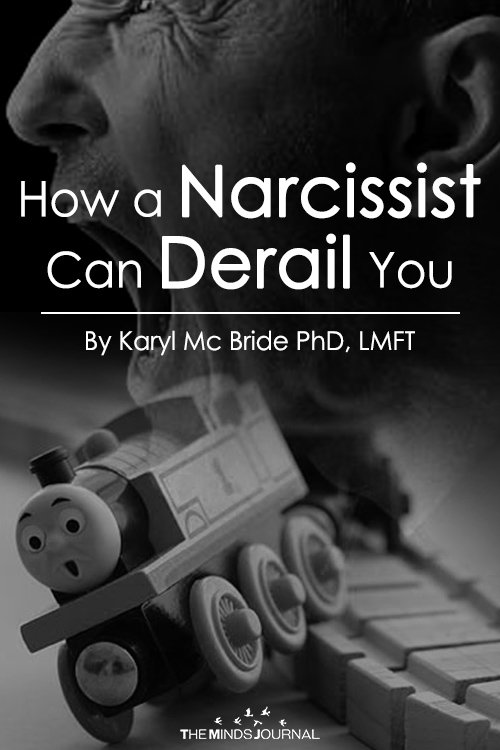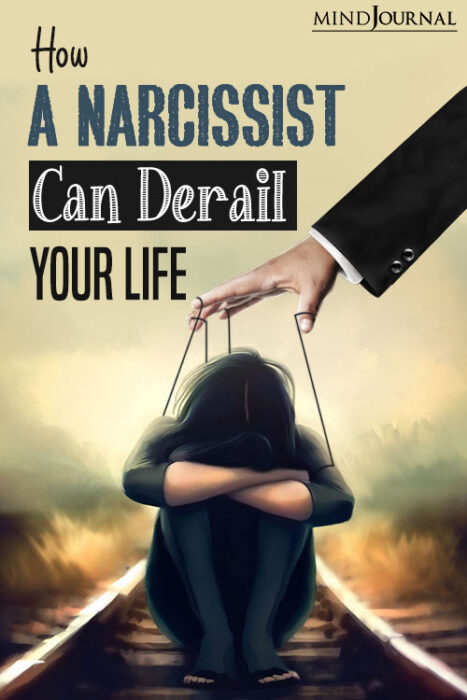How a narcissist can derail you and how to recognize the admirable traits that could make you vulnerable? Understanding narcissism can help you know what you’re dealing with!
What is it about narcissistic behaviour that leaves one scratching their head and wondering what just happened?
How A Narcissist Can Derail You?
A narcissist can derail someone in minutes, due to their own issues. To say this confuses you, shocks you, or throws you off your game is an understatement. But why does it happen? What is it about this personality that is so devastating to people in relationships?
The common understanding of narcissism is someone who is boastful and arrogant or all about themselves. But it is a much deeper, more complicated psychological issue. A narcissist is usually unable to see the impact of their behaviour because they are so out of touch with their feelings.
Read: 12 Red Flags You Are Being Psychologically Manipulated
The cornerstone of the personality is the lack of empathy—an inability to tune into the emotional world of others.
When bad things happen, others are blamed; narcissists are not accountable for their own behaviour. When they have bad feelings, those feelings are projected onto others. Deep down, the narcissist may be self-loathing, with a very fragile ego. Their sense of self is missing or undeveloped.
They have a need to be right and to win at all costs, and since their very survival depends on this, they don’t give up until they have torn others down to make themselves feel larger or superior.
Attempts to reason with them are typically a lost cause. You will likely be blamed for making them feel bad, and they may be vengeful and never get over feeling injured.
One of the dangerous things that happen when you’re involved with a narcissist is that their ability to chip away at your self-esteem can lead you to self-doubt.
People coming out of relationships with narcissists typically have a feeling of never being good enough. They experience crippling self-doubt because they have been told for so long that they are somehow wrong. As an anonymous reader recently wrote to me:
“One of my favorite examples: My ex-husband didn’t pay the light bill. He came home furious that the children and I were using candles. I showed him the delinquent bill and he yelled, ‘I paid that bill, are you going to believe your eyes or me?’ as we stood there in the dark.”
You may wonder how this can happen—and that is part of the problem. It is important to digest and understand the workings of a narcissist or you will be left confused and scratching your head.
Read: 3 Mental States That Narcissists and Sociopaths Manipulate in Others
One has to see the personality for what it is. But when you love someone, this can be hard to do. It may be your parent, your partner, a boss you admire, or even someone in your larger social circle whom you once admired.
Why do we get duped by narcissists?
First, they typically present themselves in a grandiose, confident, and charming manner. When you first meet, you can be overtaken by their charm and achievements.
It is the way of the narcissist to try to win you over. They may do this with gifts, charming words, adoration, and compliments you dearly want to believe. But if it looks too good to be true, it probably is.
A client recently told me she was dating a man who, after two months, was talking about buying a ring, moving in together, having babies, and planning a life together.
She wanted to believe this was a love-at-first-sight scenario.
This is understandable, but it can also be dangerous. This man, though highly successful and charming, ended up abusing her, physically and emotionally, within months of claiming she was the love of his life.
It is important to carefully assess those we allow into our personal space. We must go beyond what looks good on paper, and instead focus on character traits and value systems.
Read: 6 Diversion Tactics Used By Sociopaths, Narcissists and Psychopaths to Manipulate You Into Silence
When you consider getting involved with someone new, you may want to ask yourself the following questions:
- How does this person treat other people?
- How do they behave in public?
- How do they treat their children?
- Do they display kindness and empathy toward others?
- Are they judgmental or critical of other people?
- Are they intolerant of differences in culture, race, religion, or gender?
- Are they inclusive and tolerant of other people’s opinions and values?
- Do they always have to be right or win?
Another vital litmus test when becoming involved someone new is to ask yourself, “How do I feel in the presence of this person?” And you have to keep asking yourself this question, particularly when you have become vulnerable or have shared your vulnerable feelings, problems, or personal issues with them.
Over many years of treating and evaluating victims of narcissists, one issue that recurs is the deep shame people feel when they realize they have been duped. But anyone can be duped by a narcissist.
If you are a kind, loving, sensitive person who knows how to love, you can be duped, too. It is difficult to really wrap your head around the fact that some people are not capable of love and empathy.
You can imagine or perhaps know from your own experience, that this is particularly difficult if the narcissist is your parent, partner, friend or someone you deeply admire and love.
Read: 121 Things Narcissists Say When They’re Gaslighting You
Remember: Narcissism is a spectrum disorder. We all have some level of narcissistic traits. But the higher the number of traits, the more problems an individual will represent, and the more damage he or she can cause in a relationship.
The emotional damage cannot be taken lightly., including post-traumatic stress disorder, depression, anxiety, body image issues, addiction, and other concerns.
Given that any of us can be duped by a narcissist, it is important to be aware of the people in our world, our culture, and our families. Don’t be hard on yourself just because you know how to love: That is a gift. But increased awareness of narcissism may save you from devastating, crippling ramifications.
Written By Dr Karyl McBride, PhD, L.M.F.T. Printed with Permission Originally appeared on Psychology Today











Leave a Reply
You must be logged in to post a comment.